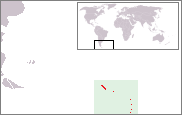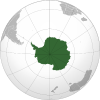| Falkland Islands Dependencies | |||||||||||||
|---|---|---|---|---|---|---|---|---|---|---|---|---|---|
| 1843–1982 Argentine Occupation: 1982 1982–1985 | |||||||||||||
 Flag
Flag(1948–1985)  Coat of arms
Coat of arms(1948–1985) | |||||||||||||
| Motto: "Desire the Right" | |||||||||||||
| Anthem: "God Save the King/Queen" | |||||||||||||
| Coat of arms of the Falkland Islands Dependencies (1952–1985)  | |||||||||||||
 | |||||||||||||
 | |||||||||||||
| Status | Overseas Territory | ||||||||||||
| Capital | Stanley | ||||||||||||
| Common languages | English | ||||||||||||
| Government | Crown colony | ||||||||||||
| Monarch | |||||||||||||
| • 1843–1901 | Victoria (first) | ||||||||||||
| • 1952–1985 | Elizabeth II (last) | ||||||||||||
| Governor | |||||||||||||
| • 1843–1848 | Richard Moody (first) | ||||||||||||
| • 1980–1985 | Sir Rex Hunt (last) | ||||||||||||
| Legislature | Legislative Council | ||||||||||||
| History | |||||||||||||
| • Established | 1843 | ||||||||||||
| • Argentine invasion | 2 April 1982 | ||||||||||||
| • Liberation | 14 June 1982 | ||||||||||||
| • Dissolution | 1985 | ||||||||||||
| Currency | Pound sterling Falkland Islands pound (from 1899) | ||||||||||||
| |||||||||||||
The Falkland Islands Dependencies was the constitutional arrangement from 1843 until 1985 for administering the various British territories in Sub-Antarctica and Antarctica which were governed from the Falkland Islands and its capital Stanley.
The territories
The following are the British territories that made up the Falkland Island Dependencies in the period between 1917 and 1962.
- South Georgia
- South Sandwich Islands
- South Orkney Islands
- South Shetland Islands
- Graham Land
- Antarctic Peninsula
In 1962 the British Antarctic Territory was formed following the Antarctic Treaty System affecting claims south of 60°S latitude, and left only South Georgia and the South Sandwich Islands as Falkland Islands Dependencies between 1962 and 1985.
History
The arrangements were first enacted by the British letters patent of 1843, and subsequently revised in 1876, 1892, 1908, 1917 and 1962. For reasons of practical convenience the Dependencies were governed by Britain through the Falkland Islands Government. However, they constituted a distinct entity that was not part of the Falkland Islands in political or financial respects.
The territorial extent of the Dependencies varied as particular territories were claimed, annexed, and commercially exploited over an extensive period of time starting with South Georgia in 1775. Responding to repeated inquiries by the Government of Norway in 1905–1907, Britain confirmed that the areas in question (between 35° and 80° west longitude) were British based on discoveries and issued the 1908 Letters Patent extending the Dependencies to incorporate the South Sandwich Islands and Antarctic mainland territory (Graham Land), with a permanent local administration in Grytviken, South Georgia, established in 1909.
The territories constituting the Falkland Islands Dependencies in 1908 were listed by the Letters Patent as "the groups of islands known as South Georgia, the South Orkneys, the South Shetlands, and the Sandwich Islands, and the territory known as Graham's Land, situated in the South Atlantic Ocean to the south of the 50th parallel of south latitude, and lying between the 20th and the 80th degrees of west longitude". In 1917, the Letters Patent were modified, applying the "sector principle" used in the Arctic; the new scope of the Dependencies was extended to comprise "all islands and territories whatsoever between the 20th degree of west longitude and the 50th degree of west longitude which are situated south of the 50th parallel of south latitude; and all islands and territories whatsoever between the 50th degree of west longitude and the 80th degree of west longitude which are situated south of the 58th parallel of south latitude", thus reaching the South Pole.
With the accession of the United Kingdom to the European Communities in 1973, the Falkland Islands Dependencies became one of the EU Overseas Countries and Territories under the Treaty of Rome, a status upheld by all subsequent EU treaties. That status of association was later enjoyed by the Dependencies' successors: South Georgia and the South Sandwich Islands and the British Antarctic Territory.
The new international legal regime introduced in the Antarctic territory south of 60° south latitude by the 1961 Antarctic Treaty prompted Britain to separate the part of the Dependencies that became subject to the Treaty. That was done by a 1962 Order in Council that established the British Antarctic Territory, leaving in the Dependencies only the island groups of South Georgia and the South Sandwich Islands, including Shag Rocks and Clerke Rocks.
Argentine occupation
Main articles: Occupation of the Falkland Islands and Falklands WarIn November 1976, Argentine armed forces landed and occupied the uninhabited islands of Southern Thule, a collection of the three southernmost islands in the South Sandwich Islands. On 19 March 1982 a group of civilian scrap metal workers from Argentina arrived at Leith Harbour, South Georgia, on board the transport ship ARA Bahía Buen Suceso and raised the Argentine flag. The scrap workers had been infiltrated by Argentine marines posing as civilian scientists. Following the Argentine invasion of the Falkland Islands, starting the Falklands War, Argentine naval forces seized control of the east coast of South Georgia after overpowering a small group of Royal Marines at Grytviken on 3 April 1982.
On 22 April 1982, the British task force arrived in Falklands waters and three days later British troops recaptured South Georgia. On 14 June, Argentine forces surrendered in the Falkland Islands; on 20 June, British forces retook the South Sandwich Islands (which involved accepting the surrender of the Southern Thule Garrison at the Corbeta Uruguay base).
Dissolution
In 1985 the Dependencies became the distinct British Overseas Territory of the British Antarctic Territory, Falkland Islands, and South Georgia and the South Sandwich Islands.
See also
- History of South Georgia and the South Sandwich Islands
- Sovereignty of South Georgia and the South Sandwich Islands
- History of the Falkland Islands
- British Antarctic Territory
- Special member state territories and their relations with the EU
References
- ^ R.K. Headland, The Island of South Georgia, Cambridge University Press, 1984. ISBN 0-521-25274-1
- Odd Gunnar Skagestad. Norsk Polar Politikk: Hovedtrekk og Utvikslingslinier, 1905–1974. Oslo: Dreyers Forlag, 1975
- Thorleif Tobias Thorleifsson. Bi-polar international diplomacy: The Sverdrup Islands question, 1902–1930. Master of Arts Thesis, Simon Fraser University, 2006. Archived 4 March 2009 at the Wayback Machine
- National Interests and Claims in the Antarctic Archived 11 December 2017 at the Wayback Machine, p. 19, Robert E. Wilson
- "The Ross Dependency", The Geographical Journal, Vol. 62, No. 5 (Nov. 1923), pp. 362–365.
- European Commission: Information on the Overseas countries and territories Archived 4 March 2007 at the Wayback Machine
- "Dispute over Argentinian Scientific Base on Southern Thule Island – Further Negotiations over Falkland Islands". Keesing's Record of World Events. July 1978. Retrieved 1 March 2010.
- "infiltrated on board, pretending to be scientists, were members of an Argentine naval special forces unit" Nick van der Bijl, Nine Battles to Stanley, London, Leo Cooper p. 8 as reported in Lawrence Freedman, The Official History of the Falklands Campaign: Vol I The Origins of the Falklands War
- "Bahia Buen Suceso set sail for South Georgia on 11 March carrying Argentine Marines" Rowland White, Vulcan 607, London, Bantam Press, p30.
- "Marines land in South Georgia". BBC News. 25 April 1982. Retrieved 1 March 2010.
- The British Antarctic Territory Order in Council, 1962. Her Majesty's Stationery Office: Statutory Instrument 1962 No. 400.
- "South Georgia and the South Sandwich Islands". CIA World Factbook. 1996. Archived from the original on 22 January 2016. Retrieved 28 October 2007.
| Antarctica | ||||||||
|---|---|---|---|---|---|---|---|---|
| Geography |
|  | ||||||
| History | ||||||||
| Politics | ||||||||
| Society | ||||||||
| Famous explorers | ||||||||
| Capital: King Edward Point | |||||||
| General | |||||||
| Settlements / Whaling stations | |||||||
| South Georgia islands | |||||||
| South Sandwich Islands |
| ||||||
| Seamounts | |||||||
| Landmarks |
| ||||||
51°42′S 57°51′W / 51.700°S 57.850°W / -51.700; -57.850
Categories:- Falkland Islands Dependencies
- States and territories established in 1843
- States and territories disestablished in 1985
- 1843 establishments in the British Empire
- 1843 establishments in South America
- 1985 disestablishments in British Overseas Territories
- 1985 disestablishments in South America
- Argentine military occupations
- Former British colonies and protectorates in the Americas
- Former colonies in South America
- 20th century in the Falkland Islands Dependencies
- 19th century in the Falkland Islands
- History of South Georgia and the South Sandwich Islands
- National Reorganization Process
- Special territories of the European Union
- 1980s disestablishments in Antarctica